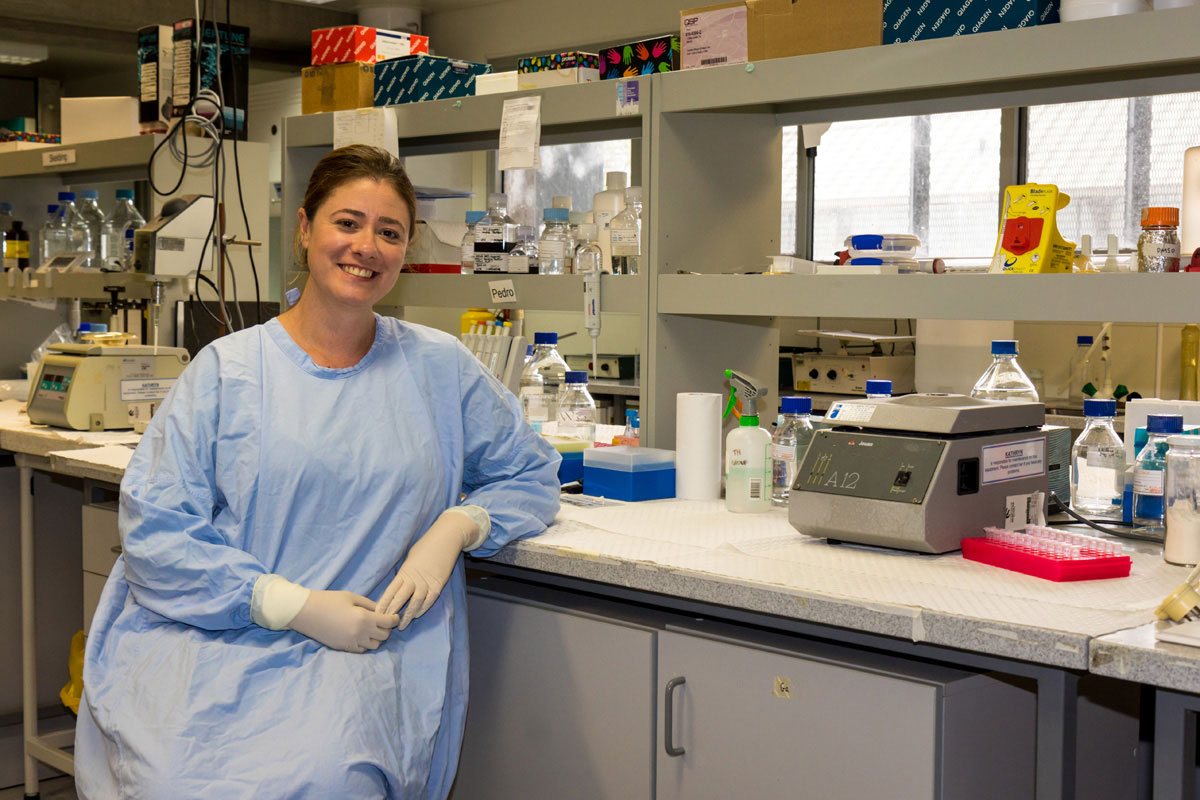Researcher Highlights
Cells, signalling and cancer therapies
From an early age, Dr Kathryn Skelding was fascinated by how the body works, and this focus continues to drive her desire to understand how diseases develop and how they can be treated.

A molecular biologist with expertise in cell biology, Kathryn believes that if we can understand the processes of cancer cell proliferation, survival and the development of resistance to chemotherapeutics, we can develop new, targeted anti-cancer therapies.
An early career researcher with an expertise spanning from fundamental biochemistry to clinical evaluation of new anti-cancer therapeutics, Kathryn has already made important contributions to science. And it’s her innate curiosity that’s driven her work.
"I always wanted to know why – why does that disease develop? How does that treatment work?" Kathryn says.
"So it was just natural that I would become a medical researcher who investigates the causes of diseases, so that we can develop new and better treatments." This curiosity continued throughout her undergraduate studies, where Kathryn graduated with first class Honours and the University Medal in Biomedical Science from UON.
The development of new targeted therapies for a varieties of cancer was an early theme of her research; Kathryn’s doctoral studies examined the use of novel oncolytic viruses as treatments for breast cancer, and were funded by a National Breast Cancer Foundation Scholarship. Phase I trials for these viruses showed that they were safe and well-tolerated, with evidence of disease stabilisation.
Kathryn’s choice of research field was greatly influenced by personal experience, as several people close to her have been affected by cancer. "While it's well-known that side effects are associated with chemotherapy, it's only when you actually see what these drugs do to someone that it really hits home how toxic they are," she says.
Her research is focussed on brain cancer, leukaemia, breast cancer and prostate cancer – but it is the first two topics that hold Kathryn’s strongest focus. “Both leukaemia and brain cancer are unique in that they have very poor outcomes that have remained unchanged for decades. Both diseases are still fairly under-researched and the survival rates have remained static – we need more research into these areas.”
Kathryn studies how cancer cells function so that she can better understand how cancer cells grow, spread and develop resistance to chemotherapy drugs. "If scientists can better understand these processes, we can develop new treatments for cancer that are more cancer-cell specific and have fewer side effects," she says.
Kathryn is exploring the role of targeting in regulating cancer cell proliferation, invasion and resistance to chemotherapy, exploring how novel inhibitors can play a role in targeting pathways. The aim is to develop new therapies and kill the cancer cells – with maximum effectiveness, while minimising side-effects.
Cell biology and leukaemia
With her leukaemia research, Kathryn’s team is focussed on a protein molecule called BAALC (brain and acute leukaemia, cytoplasmic), which is associated with aggressive disease that is more likely to recur, and also indicate that chemotherapeutic drugs may not be effective against these leukaemia cells. "My lab focuses on a molecule that is present in high amounts in leukaemia cells, and that we have shown is involved in controlling cancer cell growth and survival."
Kathryn has dedicated her attention to developing a new inhibitor for this molecule, and the results are promising. This inhibitor is currently being developed with Newcastle Innovation, a University of Newcastle company that bridges gaps between technology and commercial partners, with the aim of introducing these technologies into clinical use.
Working closely with her colleagues in the University's Priority Research Centre for Cancer, and through her association with the Hunter Medical Research Institute (HMRI) Kathryn has also established important links and relationships with clinical oncologists which continues to fuel her research.
Over her career, Kathryn has been successfully awarded funding from a broad range of bodies, which is vital to translating research findings into the clinic. With so many exciting outcomes in her early research career, Kathryn’s focussed research is bound to lead to treatments which can not only lead to improved patient outcomes – but a better quality of life.
The University of Newcastle acknowledges the traditional custodians of the lands within our footprint areas: Awabakal, Darkinjung, Biripai, Worimi, Wonnarua, and Eora Nations. We also pay respect to the wisdom of our Elders past and present.